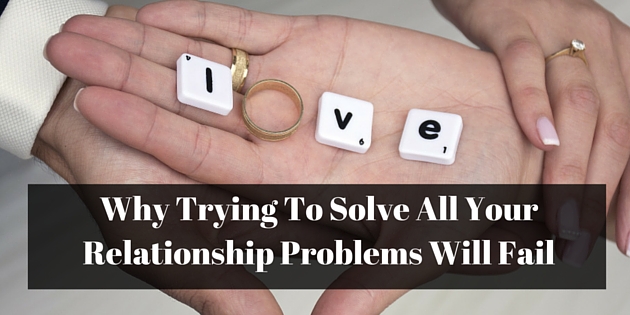Source: http://www.huffingtonpost.com/kyle-benson/how-to-fight-if-your-marr_b_10822930.html
Love can be a battleground of mistakes, misunderstandings and conflicts. Oftentimes when we want to discuss a specific conflict with our partners, we also want the floor to discuss EVERY conflict with our partner; every one of their 617 boneheaded mistakes. After all, we are an “expert” analyst of our partner’s behavior and personality disorders.
Meet Jasmine. Jasmine is a full-time employed mother of two. She’s married to Brian, a hard working business owner with 64 employees. Jasmine and Brian strive to be a super couple; the kind of couple that exhausts themselves trying to do it all.
Their childhood upbringing has taught both of them to be overachieving perfectionists who put a lot of pressure on themselves to be “happily married.”
Most of this pressure comes from Jasmine. She wants the best orgasms, a passionate sex life, millions in the bank account, and two adorable and successful kids. All this weight causes a lot of problems with Brian.
In her mind, Brian doesn’t help out with the children or house nearly enough. He doesn’t dedicate enough time to their relationship and he isn’t making enough money.
Needless to say, Jasmine’s Love Laws puts Brian in Relationship Jail pretty frequently. As a result, she shames him. She makes him feel inadequate. She treats him this way so much that he has started to spend more time working than he does at home.
For Brian, work is a safe haven from the war at home. As Jasmine starts to realize their relationship is in trouble, she devours books on healthy relationships like a fat kid at a cupcake store. She heard about John Gottman’s famous State of the Union meeting that was created to resolve relationship conflicts. So she schedules a meeting to “talk” with Brian about their current conflicts.
Because she’s so eager to start the meeting, Jasmine takes the lead as the speaker. She tells Brian the role of the listener according to what she can remember: “just listen to me and don’t get defensive.”
Unfortunately Jasmine hits Brian so hard with criticism that his helmet in the football game of love pops right off. This leaves him vulnerable to a siege of attacks from his lover, who brings up every issue under the sun. His lack of help with the children. His lack of effort in keeping the house clean. His routine sexual performance that feels more like clockwork and less like lovemaking.
Hearing all this makes Brian feel inadequate. Something back in his childhood made him sensitive about that feeling. His body floods with negative emotions. Despite trying to do his best to “listen,” he emotionally shuts down to calm his anxiety.
Jasmine notices this and hits him even harder.
“You never listen to me.”
“What is wrong with you?”
By now, this relationship is on the road to the Hell, whether it be divorce or infidelity. But there are many lessons we can learn from this.
Pick One Issue and Be Specific
Instead of bringing up every issue under the sun, focus on one particular issue and stay on topic. Be detailed. Instead of saying, “you never help out around the house,” say, “It makes me feel abandoned when I feel like it is my responsibility to vacuum the house every week. On top of that, I have other chores I feel like I have to do to keep this house running. Would you be able to vacuum every other week for me?”
Telling someone they make you feel insecure gives them no feedback to change their behavior. However, telling your partner that you feel insecure when they make fun of you in front of your friends will allow them to fix that specific situation.
By focusing on one issue and the specific emotions it causes you (not your partner’s flaws), both of you can come together to fix that specific situation by changing both the meaning of the situation and each other’s behavior.
Avoid Your Partner’s Triggers
Lastly, be aware of your partner’s triggers. No one grows up without emotional scars. These lasting flaws can escalate conflict quickly. Tom Bradbury, a UCLA psychologist, calls these enduring vulnerabilities.
Imagine your partner’s weaknesses are tattooed on their forehead. What might your partner’s weaknesses and insecurities be? When they get blamed, do they immediately become defensive? Do they hate being lectured because it makes them feel inadequate?
Brian’s vulnerabilities of not providing enough make him feel inadequate. It causes him to close off from his relationship and the things he cares about. When his trigger is hit, it’s easier to become numb than to feel the pain of all his past traumas rising in the present.
Your partner’s childhood baggage may be a source of problems in your relationship, but it is unrealistic to expect that he or she will fix them immediately. Prodding or insisting them to “change” will only worsen the situation.
What you can do is prevent a particular vulnerability from causing friction by acknowledging it and working around it with compassion. If you know your boyfriend is sensitive about feeling left out, be kind when suggesting that he should stay at home so you can go out with your friends for a girl’s night. You could say something like “I love going out with my friends and you because we always have a good time. But would it be okay if I just went out with them tonight? I’d like to catch up with them on a more intimate level.”
Or maybe your girlfriend is a tad messy, and resents her childhood upbringing of rigid house rules. She may even appreciate a break when it comes to her messy clothes on the chair in the bedroom.
During my own relationship conflicts, I’ve found it helpful to remind myself that my partner is learning to work with my insecurities, just like I am with hers. Love isn’t always a comfortable ride. But having a partner who will drive around your potholes, while still addressing the underlying issues, is a partner you should keep.
This was originally published on KyleBenson.net.








